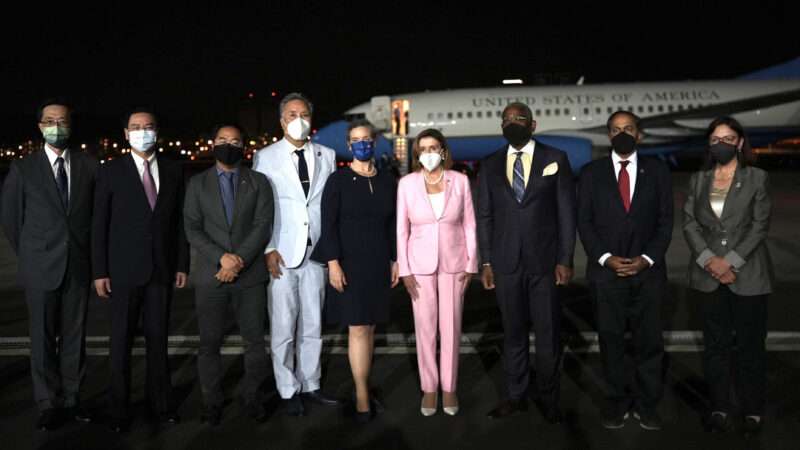
Why is House Speaker Nancy Pelosi (D–Calif.) in Taiwan? It's not, apparently, at the direction of the Biden administration, which smacked down the proposal when Pelosi's office began floating it last month. "I think that the military thinks it's not a good idea right now," President Joe Biden said then. Congress is a coequal branch of government with the executive, of course, and Pelosi can travel wherever she chooses. But just because she can go doesn't mean she should.
Pelosi's trip is needless and reckless, with obvious downsides and no clear upside. In fact, the best possible result of this visit is maintenance of the status quo. The worst possible result is unspeakably grim.
The Chinese government has been testy about the Pelosi plan from the moment the idea was raised. Other U.S. officials have visited the independent, democratic island which Beijing claims as its own, including a surprise trip by a contingent of lawmakers this past May. But Pelosi became the highest-ranking American to travel to Taipei in 25 years when she landed there Tuesday night, and Beijing has insisted its military "won't sit by idly" if Pelosi and her contingent threaten China's "sovereignty and territorial integrity."
The extent of that response remains to be seen. Even before Pelosi landed in Taipei, Taiwan reported a DDoS attack, which overloads a website with automated traffic so it can't be easily accessed by real users, on its presidential and foreign ministry sites. More troubling than that is China's suspension of imports on Monday from dozens of Taiwanese baking businesses. "I learned about the ban before I got off work last night," a manager at a targeted food company told Reuters for a report published Tuesday, adding that he'd heard other "food companies saying their products had been rejected at China's customs already."
Then there's the question of military action. After the May visit, Beijing sent 30 warplanes flying into Taiwan's Air Defense Identification Zone (ADIZ), a fairly mild escalation of what has become a regular practice since early 2021, usually with fewer jets at once. Throughout this year, Taiwan has been preparing its air raid shelters in case a similar incursion turns violent. And as Pelosi's plans took shape, the Chinese Navy "announced additional military exercises in the South China Sea and live-fire drills in the Bohai Sea, near the Korean Peninsula, this week," while the Taiwanese government reported multiple Chinese military flights which entered the ADIZ on Monday and Tuesday but did not cross the Taiwan Strait.
We can condemn Beijing's policy while also recognizing that it is a direct reaction to Pelosi's trip. It's a classic example, in fact, of the "security dilemma," which Harvard University international relations professor Stephen M. Walt explains at Foreign Policy as "how the actions that one state takes to make itself more secure—building armaments, putting military forces on alert, forming new alliances—tend to make other states less secure and lead them to respond in kind."
"The result," Walt continues, "is a tightening spiral of hostility that leaves neither side better off than before."
That's exactly what's happening here. Pelosi's visit to Taiwan, which is not forming a new alliance but certainly making a show of Washington's support for Taipei against Beijing, is perceived as a threat by China, which answers with threats of its own. "Each side's efforts to deal with what it regards as a potential security problem [have] merely reinforced the other side's own security fears," Walt writes, "thereby triggering a response that [has] strengthened the former's original concerns." That China's government is authoritarian and genocidal and ought to leave Taiwan alone doesn't change the reality of this dynamic, however much we might wish it did.
So why is Pelosi in Taiwan? The most probable reason may simply be burnishing her legacy. She has a long record of criticizing Beijing, is expected to lose her speakership after the midterms this November, and, at 82, is surely nearing retirement.
But whatever Pelosi's personal justification for the journey, it's not helping anyone else. This is a photo op, a symbolic gesture. The speaker's presence in Taipei will not magically make Taiwan freer or more secure from Chinese invasion. If anything—insofar as her plans have escalated the war of words between Washington and Beijing and led to Chinese shows of strength—she has made Taiwan less secure and heightened the risk of a U.S.-China war. It's an irresponsible, myopic, and, hopefully, soon-forgotten mistake.
The post Pelosi's Trip to Taiwan Might Be Good for Her Legacy, but It's Bad for Everyone Else appeared first on Reason.com.







